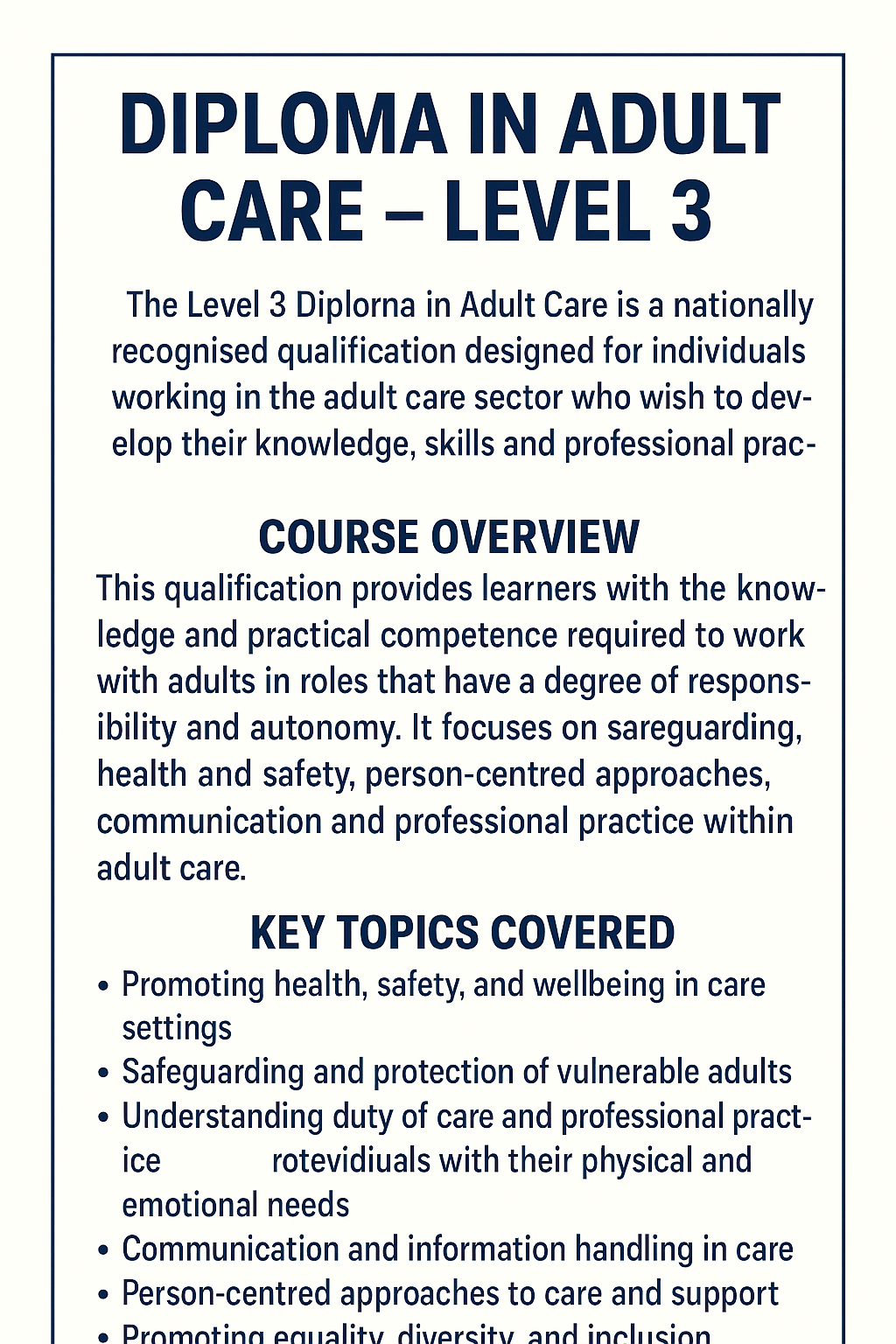
Diploma in Adult Care – Level 3
The Level 3 Diploma in Adult Care is a nationally recognised qualification designed for individuals working in the adult care sector who wish to develop their knowledge, skills, and professional practice. It is aimed at care workers, support workers, and senior care staff who have responsibilities for providing care and support to adults in a range of health and social care settings.
Course Overview
This qualification provides learners with the knowledge and practical competence required to work with adults in roles that have a degree of responsibility and autonomy. It focuses on safeguarding, health and safety, person-centred approaches, communication, and professional practice within adult care.
Key Topics Covered
- Promoting health, safety, and wellbeing in care settings
- Safeguarding and protection of vulnerable adults
- Understanding duty of care and professional practice
- Supporting individuals with their physical and emotional needs
- Communication and information handling in care
- Person-centred approaches to care and support
- Promoting equality, diversity, and inclusion
- Supporting individuals with dementia, learning disabilities, or complex needs
- Lead and manage a team within adult care (for senior roles)
Who is it for?
- Adult care workers, senior care assistants, and support workers
- Those working in domiciliary care, residential care, or community care settings
- Individuals wishing to progress to supervisory or leadership roles within adult care
Entry Requirements
- Learners must be aged 16+
- Usually employed in a suitable adult care setting
- Level 2 qualification in Health and Social Care (or equivalent experience) is beneficial but not always required
Assessment
- Portfolio of evidence (work-based observations, written assignments, reflective accounts)
- Demonstration of competence in real work environments
- No final exam – assessment is continuous and competency-based
Progression
On completion, learners can progress to:
- Level 4 Diploma in Adult Care or Level 5 Diploma in Leadership for Health and Social Care
- Roles such as senior care worker, care supervisor, or team leader
- Teacher: Muzammal Haider
- Teacher: Aila Sam

Course Overview
The NCFE CACHE Level 3 Diploma was a vocational, competence-based qualification. This means it was designed to assess both your practical skills in the workplace and your underlying knowledge. It was the required qualification to be considered a "full and relevant" Level 3 practitioner in England, meaning you could be counted in staff-to-child ratios in early years settings.
Awarding Body: NCFE CACHE (Council for Awards in Care, Health and Education). They are a specialist awarding organisation for the care and education sector.
Level: Level 3 on the Regulated Qualifications Framework (RQF), equivalent to A-Levels.
Target Audience: Practitioners working unsupervised with children and young people.
Primary Objectives
The course aimed to equip learners with the advanced knowledge and skills needed to:
Promote the welfare, development, and learning of children and young people.
Implement safeguarding procedures to protect children from harm.
Develop reflective practice to continuously improve their work.
Understand the importance of partnership working with parents, carers, and other professionals.
Support positive outcomes for all children, including those with disabilities or special educational needs.
Who Was This Course For?
This diploma was essential for a range of roles, including:
Early Years Practitioners (in nurseries, pre-schools, reception classes)
Childminders
Teaching Assistants / Learning Support Assistants
Residential Care Workers
Youth Work Assistants
Course Structure and Content
The qualification consisted of a mix of mandatory units (which everyone took) and optional units (which allowed learners to specialise based on their role).
Mandatory Units (Core Topics)
These units covered the essential, universal knowledge required for all practitioners:
Promote Communication in Health, Social Care or Children’s and Young People’s Settings: Effective communication with children, families, and colleagues.
Engage in Personal Development in Health, Social Care or Children’s and Young People’s Settings: Reflective practice, understanding standards, and planning professional development.
Promote Equality and Inclusion in Health, Social Care or Children’s and Young People’s Settings: Championing diversity and ensuring fair treatment for all.
Principles for Implementing Duty of Care: Understanding the legal obligation to keep children safe and promote their welfare.
Understand Child and Young Person Development: A comprehensive unit covering the expected patterns of physical, cognitive, language, and social-emotional development from 0-19 years.
Promote Child and Young Person Development: Practical strategies to support and encourage development through activities and positive relationships.
Understand How to Safeguard the Wellbeing of Children and Young People: A critical unit on child protection legislation, recognising signs of abuse, and reporting procedures.
Support Children and Young People’s Health and Safety: Risk assessment, creating safe environments, and dealing with accidents and emergencies.
Develop Positive Relationships with Children, Young People and Others Involved in Their Care: Building strong, trusting, and professional relationships.
Working Together for the Benefit of Children and Young People: The principles and practices of multi-agency teamwork.
Optional Units (Specialist Pathways)
Learners chose from a wide range of optional units to tailor the diploma. Examples include:
Supporting children with speech, language, and communication needs.
Supporting disabled children and children with specific requirements.
Promoting positive behaviour.
Supporting children during transitions and significant life events.
Planning and implementing curriculum frameworks like the Early Years Foundation Stage (EYFS).
Assessment Methods
The qualification was assessed through a combination of methods, typical of vocational courses:
Workplace Observation: An assessor would observe the learner in their real work setting to assess their practical competence.
Portfolio of Evidence: Learners built a portfolio containing written assignments, projects, reflective accounts, and professional discussions that demonstrated their knowledge and understanding.
Expert Witness Testimonies: Statements from managers or senior colleagues confirming the learner's competence.
Career Progression and Replacement
Career Paths: Successful completion allowed learners to work as qualified Level 3 practitioners in roles such as Nursery Nurse, Early Years Educator, Teaching Assistant, or Playworker.
Further Study: It provided a direct pathway to higher education, including Foundation Degrees or full Honours Degrees in areas like Early Childhood Studies, Primary Teaching, or Social Work.
- Teacher: Muzammal Haider
- Teacher: Aila Sam